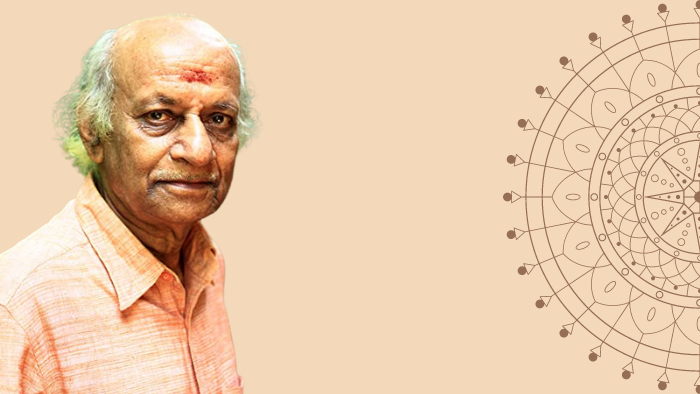“The book [Power in Temples] has given me many insights into Indian culture and the relationship between science and religion,” Thomas R. Pickering, former U.S. Ambassador to India says about the book authored by K B Nair (pen name Srikant), founder of Integral Books, whose publications have found resonance with people curious about India and Sanatana Dharma.
Dr Ved Chaudhary says reading the book Sri Ganesha from the viewpoint of Hindu parents in the US who face the challenge of teaching their children about Hinduism is refreshing. “School and college textbooks and reference material routinely feed misinformation about Hinduism. For these parents, Integral Books has undertaken a very much needed and timely endeavor indeed. It is an admirable treatise full of vast amounts of pertinent information presented in the larger concept of theory and universal tenets of Hinduism, so that it all makes complete sense together - or as the young people would say, it all hangs together.”
In this interview, Srikant ji shares his thoughts on how Indic wisdom can become more mainstream.
How can Indian wisdom be made more mainstream as universal education?
Unlike some 50 years ago the global intellectual situation is more receptive today to the rationale of India’s spiritual heritage. In an extreme existential crisis, which is unprecedented in history, humanity is in quest of a worldview that satisfies the intellect with an in-depth meaning in life and fulfills harmoniously social needs. The root cause of the present crisis is traceable to the continuing mechanistic influence of 19th century science that denies higher spiritual possibilities and the mental shrinking due to religious fundamentalism.
The very basis of Indian inquiry for ages past fits in well with the modern scientific temper and emphasizes the Vedic concept Vasudhaiva-kutumbakam
A concerted effort for the reassessment and elucidation of the principles ingrained in the Puranic lore, traditional sciences and ritualistic practices in the light of modern scientific perspective will help better comprehension of their perennial value. Through research to reveal their rationale in realizing the potentials and evolutionary possibilities of human life, they can be well amalgamated in the mainstream of universal education. The world should be made aware of the fact that this is the heritage of the whole of humanity for evolving a superior world civilization.
Science comprehends and corroborates Sanatana Dharma, most of the time. One may see a gap but rarely a contradiction. Can you share your thoughts?
Science cannot contradict Sanatana Dharma. As science advances, it finds that the knowledge of India’s ancient explorers is advancing beyond its reach. This fact is thought-provokingly corroborated by an unanticipated source - Prof. Alexander Spirkin, a scholar of dialectical materialism and head of the department of cybernetics in the erstwhile USSR Academy of Sciences, in his book, Dialectical Materialism (Progress Publishers, Moscow Eng. Edn. 1983). In his attempt to update his subject, while examining some other systems of thought he observes: “The sages of ancient India knew much that even today is beyond the ken of European scientific thought or that it ignores, often trying to conceal its helplessness by asserting that oriental wisdom is mere mysticism, and thus showing its inability to distinguish the rational but not yet fully understandable essence from various figments of imagination.” He concludes the two-page commentary thus: “Does this not go to show an astonishingly high level of culture that should arouse our admiration, gratitude and desire to study!”
His observation highlights the prevailing inability, even of the academic system in India where this life-evolving wisdom originated, to distinguish the essence from the mythological elements in which the profound facts are couched by the ancient explorers to preserve the knowledge through the great passage of time. This observation assumes special significance because it shows the perennial relevance of India’s heritage that can inspire even a scholar of materialism to think aloud in such terms when one gets rationally introduced to the knowledge field.
It is not mere informative knowledge the world has to seek from such a fund of existential wisdom, but from it has to evolve new practical techniques to take humanity to a superior status that invalidates war and viruses. Carl Sagan in his book The Dragons of Eden quotes the Greek philosopher Plotinus: “Mankind is poised between the gods and the beasts.” The goal of India’s spirituality is this evolution to greater existence, which is blocked by materialistic shortsightedness and the fundamentalist religiosity. It is high time India’s academic system should shed its lethargy in investigating into the profound treasures of the heritage.
What do we know about the minds of our rishis from our knowledge systems?
It seems the academic system in India has yet to realize that the fund of knowledge we inherit are the findings through in-depth investigations of the rishis, who discovered the higher dimensions of the universe and the evolutionary possibilities of the stream of life. The knowledge facilitates the natural evolution of humanity to greater dimensions of existence. This was an all-comprehensive investigation from various angles that gave form to a well-coordinated system of Vedantic wisdom. It covers a wide range of topics, from the origin of the universe to the formation of the human cerebro-spinal system that can probe into the subtlest secrets of the universe.
It is of immense significance that up to the 18th century modern science was not aware of the role of the brain as a receiver of sensations and seat of the mind (The Human Brain by Isaac Assimov) and that since many centuries the yogic perspective has been giving the cerebro-spinal system prime importance as the very foundation of the future evolution of mankind. It traces the subtlest energy states in the spinal cord and the brain. They gave these energy states symbolic divine representations as the basis of different formations of the human body.
Sir John C. Eccles, Nobel laureate for Medicine and Physiology, reminded the scientific community that if the value of research is to be measured against its intrinsic value to humanity, brain research is comparatively more important than space research. The scientist must have meant the crucial need of discovering the in-depth facts of human consciousness so that humanity can survive a holocaust by nuclear and bioweapons looming like the sword of Damocles and to evolve a humane world-civilization. Modern research can greatly draw ideas from the profound Yogic and Vedantic knowledge of the human consciousness.
Is there any new knowledge being created in India of everlasting value?
India can contribute considerably to the emergence of a science of human possibilities that will help evolve a superior humanity with the expression of the latent cosmic faculties and the freedom of universal consciousness, which is the natural line of human evolution, as conceived by India's spirituality.
Materialistic logic is based on 19th century science, the influence of which is prevalent even today, that considered atoms as ‘inert’ and indivisible units that formed the foundation of the universe, This belief blocked the higher evolutionary vision of life by asserting that it is a mechanistic and purposeless process. It brought a conservative stagnation to the human mind. When the evolutionary vision of spirituality is lost, the mind reverts to lower tendencies, resulting in wars, manufacture of lethal weapons, drug abuse, etc. India has the scientific solution to this dangerous situation. It is in this context that Sir Arnold Toynbee, eminent historian, gives a warning advice to humanity: “In this transitional chapter of world’s history, a chapter which had a Western beginning, it is already becoming clear, will have to have an Indian ending if it is not to end in the self-destruction of the human race.”
As the historian makes this statement, he evidently had anticipated that India’s scientific spirituality can in combination with modern science create a new knowledge of everlasting value that will save humanity from possible self-destruction and contribute to evolve a higher civilization.
According to the law of natural selection, which Darwin postulated as a chance process, those life forms which do not overcome the challenges posed by nature will not survive and get destroyed. Here humanity is placed in a similar situation. Through evolutionary process the human being is bestowed with such faculties as power of thought, discrimination and creativity. Contrary to the materialistic perspective that evolution is a goalless phenomenon, even Darwin in his later years had an inkling of the role of a certain latent value system in the evolutionary process.
For example, if the value of motherly love that enables the survival of the helpless infants had not emerged at a certain stage of evolution, life would not have reached beyond the stage of worms. According to the rishis of India, the super-biologists, there is a latent value system in the very fabric of the universe, which they termed Dharma. It is this eternal value system, the Sanatana Dharma, which gradually gets expressed as the cultural values in the phenomenal stream of life. They revealed that the line of evolution from the human stage lies in the value-based realization of the higher human possibilities. Materialism overruling the possibility of further human evolution degrades it. The faculties of thought, discrimination and the power of creativity are the fuel for further evolution, but these cause downfall unless they get refined with spiritual discrimination. As the Bhagavad-Gita reminds: One is one’s own friend and enemy, too. (6.5)
Can you shed light on your different books?
As it often happens with innovative missions, this was also set up on individual initiative, as a part of my inborn trend of spiritual quest. Having an academic background of biological sciences, journalistic training in Calcutta University, professional experience in Publications Division, Govt. of India, ITDC, etc., the turn of events led me to choose a life of experiential yogic inquiry which continues in comparative solitude near the well-known Anandashram in northern Kerala. This research and publishing mission becomes a congenial part of the pursuit. As mentioned, it is essentially an effort to verify India’s spirituality as a practical biological science of human evolution and the quest is gaining affirmative confirmation as the years advance.
Integral Books was first set up in Madras in 1979-80 with publication of the first book, Sri Mookambika: The Radiant Grace, a book on the powerful shrine of Divine Mother, the Source, Who is the perennial inspiration. I was then assisting for a short span of time the publications unit of Vivekananda Kendra located in Triplicane. Then, like a divine guidance, inadvertently I came across an ancient palm-leaf Sanskrit astrological record in Mylapore. It revealed that this mission would be set up in that sea-shore city, its further course and destiny to contribute to Arya-dharmasya vriddhi. (Of course, such revelations are essentially based on the karma situation and can give clues for further modern investigations. Surya-Gita is a less-known text that deals with this field of knowledge.)
It was a very challenging start without resources. The second publication was Power in Temples, a booklet of 48 pages. (Now it is a full-fledged illustrated book of 240 pages.) It was the first book to present temple worship from this perspective and its innovative character attracted many spiritual luminaries and savants. Swami Ranganathananda, Swami Chinmayananda, M.P. Pandit, Justice V.R. Krishna Iyer and several others commended its revised and expanded version. The Central Chinmaya Mission Trust, Mumbai, ordered the book and supplied it to all their educational institutions with the note - “CCMT’s gift to your Library with Pujya Gurudev’s blessings.”
My exploration was to promote universal awareness of India ’s spirituality essentially as a value-based science of human evolution. The updated presentation can bestow a heart to modern scientific inquiry and help fulfill it. Just giving an example, Darwin in his theory of natural selection presents the role of Nature in organic evolution. It is presented as a process of mere mechanical actions and reactions. On the other hand, Sage Patanjali in his Yogasutra presents the nature of evolution as: jaatyanthara parinamah ptakrithyapooraat (4.2) This is an advanced theory which reveals that both the inorganic and organic evolution are the expressions of the facilities imbibed from Nature, which is a repository of infinite possibilities. Presentation of such points will inspire researchers for further exploration.
Citing another example, Sir Julian Huxley, the evolutionary biologist, talks about the need of evolving a new science for “the fuller realization of more possibilities by the human species collectively and more of its component members individually.” Here the scientist inadvertently emphasizes the salient point in the Bhagavad-Gita of the need of socializing the individual without losing the value of individuality to evolve a superior humanity. This is the evolutionary method to realize the unconditioned freedom of the Supreme Self (Purushothama), the goal of the human state, as conceived by India’s spiritual vision and highlighted by Sri Aurobindo.
In my experiential pursuit Patanjali’s Yogasutra is a guiding text and I am working to write an elucidation of it from a modern biological perspective . Another programme being planned is a similar study of Sri Lalitha-sahasranama-stotram.
India’s treasures, the Bhagavad-Gita, Yoga-vasishta, Devi-mahatmya, Yoga-sutra, Sri Lalitha-sahasranama-stotram, to mention a few, offer enormous possibilities for the new generation for research and reveal the knowledge in updated terms. Such research will inspire a paradigm shift in thought that will help remove the materialistic blockage in the evolutionary vision of science, which is the cause of today’s retrogressive trends of war and self-destruction.





